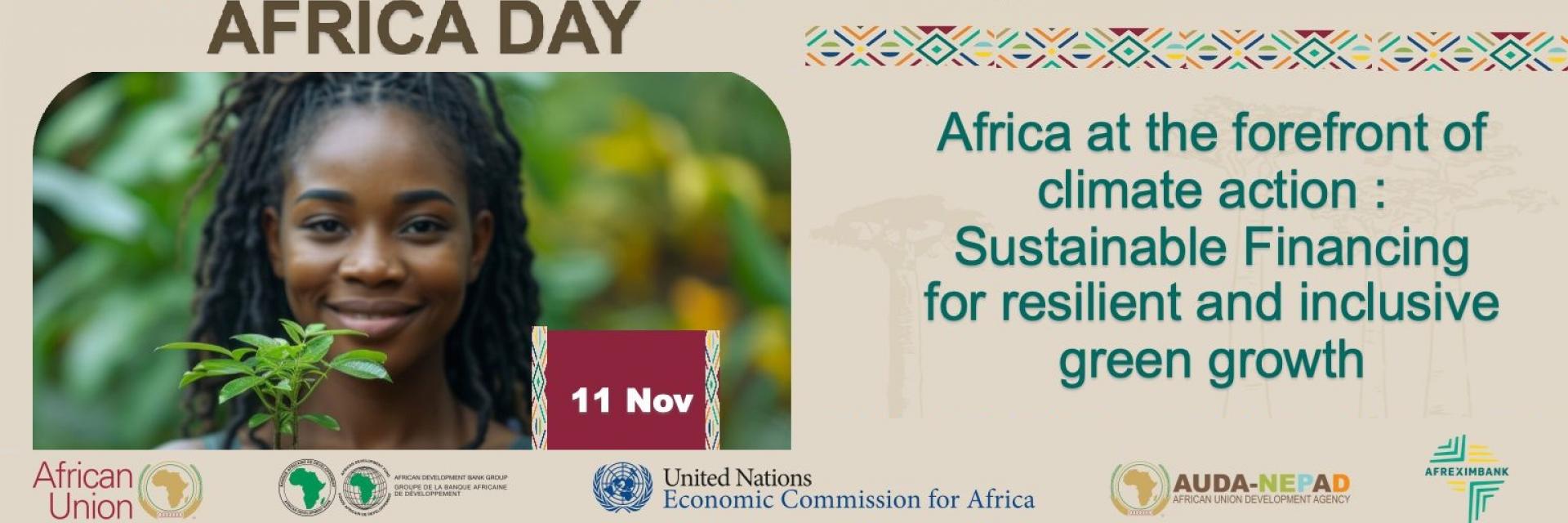Africa Day
COP30 Africa Pavilion, 11th November 2025
Key Messages on Climate and Development
Introduction
At the COP30 Africa Day event, the main message was clear: climate action and development are inseparable. The continent must achieve convergence between its development and climate goals, moving decisively from high-level rhetoric to sustained implementation on the ground. This requires systemic reform of the global financial architecture to secure fair, predictable and adequate climate finance, especially for implementing NDCs and adaptation plans, in line with Common but Differentiated Responsibilities (CBDR), and with governance and carbon markets redesigned to reflect Africa’s realities.
Africa day key messages
1. Africa’s Pillars for Converging Climate & Development
-
Shift from promises to action: Implementation of existing commitments—NDCs, NAPs and just transition strategies—must be prioritized over new declarations.
-
Fix climate finance and architecture: Africa needs reformed global finance systems that deliver fast, fair and fit-for-purpose finance, focused on grants and highly concessional public finance as emphasized in Article 9.1 of the Paris Agreement. Adaptation finance, including support for the Global Goal on Adaptation (GGA), is the continent’s top priority.
-
African-led solutions: From the ClimDev-Africa Initiative to innovative climate-resilient financing and nature-based solutions, Africa is already demonstrating leadership. Civil society and non-state actors are empowering local communities, while African financial institutions are supporting adaptation, early warning systems and climate-proof intra-African trade.
-
Negotiating for justice: Africa’s position stresses adequate climate finance, operational and accessible Loss and Damage arrangements, just energy transitions that close the energy access gap, and meaningful technology transfer backed by financing and institutional support—not just private investment.
2. Voices from Africa’s Institutions
-
AUC & PACJA: Africa’s voice must be amplified in global climate discourse. Climate action is a matter of survival, and must be equity-driven, inclusive and accountable, ensuring no community is left behind.
-
ECA: Climate change is reshaping Africa’s economies—climate action is imperative, not optional. Africa needs growth-oriented, resilient strategies that protect natural capital, but domestic resources are insufficient; closing the adaptation gap demands enhanced international support and equitable access to climate finance.
-
Afreximbank: The Bank supports home-grown, trade-linked climate solutions and nature-based approaches. The AfCFTA is a platform for green industrialization, sustainable trade and long-term climate investment, and global outcomes must advance Africa’s structural transformation.
-
AfDB: Africa comes not in search of aid, but to affirm partnerships and opportunities that recognize its leadership. Despite safeguarding global public goods like the Congo Basin, Africa receives less than 3% of global climate finance. AfDB prioritizes sustainable climate finance, youth-led green investments, resilient infrastructure and continued support to initiatives such as ClimDev-Africa.
-
Loss and Damage Fund: Its operationalization must ensure equitable access, simplified procedures and swift disbursement to vulnerable communities, grounded in justice, transparency and country ownership.
-
AGN: This COP must deliver measurable progress on adaptation finance, with clear indicators aligned to Africa’s needs. Current pledges are far below requirements. A just, development-centred energy transition and fully financed technology transfer are non-negotiable.
-
UNFCCC & ACS Secretariat: With the world’s youngest population and vast natural resources, Africa is part of the solution—yet it loses up to 9% of GDP annually to climate impacts. The journey from Nairobi to Addis Ababa to Belém (COP30) frames a common African narrative: move from aid-based to investment-based climate action, anchored in climate justice, partnership and shared prosperity.
3. Core Call to Action
To unlock Africa’s full potential and reverse escalating climate losses, the international community must:
-
Deliver scaled, predictable public climate finance for adaptation, loss and damage, and just transitions.
-
Reform financial and carbon market systems so they work for Africa, not against it.
-
Back African-led initiatives and investments that align climate action with jobs, industrialization and resilience.
Africa brings ideas, resources and political will. What is needed now is fast, fair and transformative finance to match its ambition.

